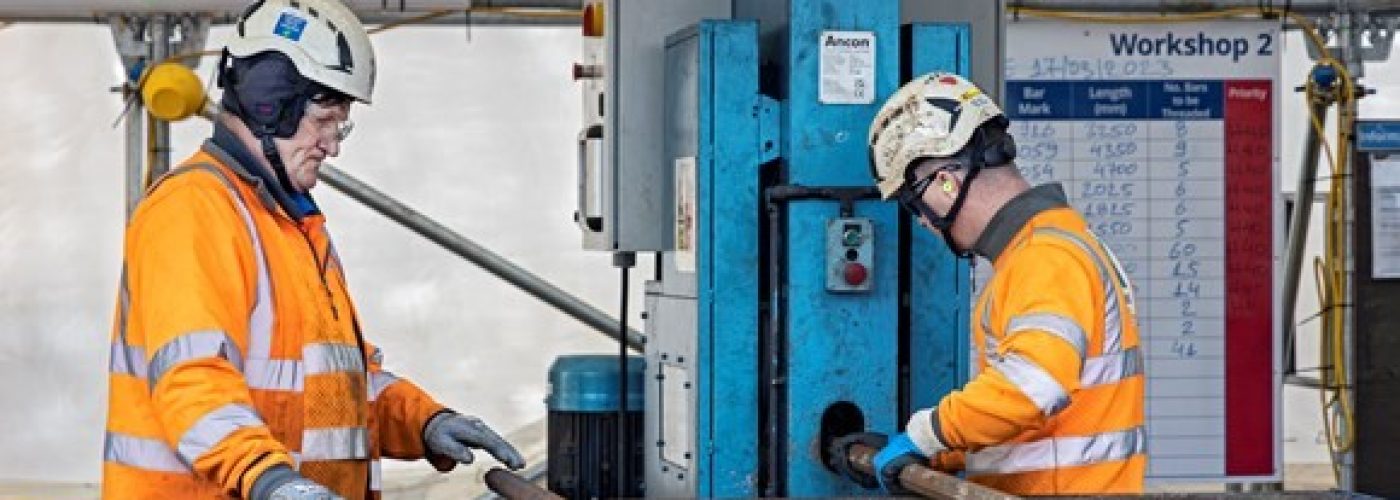- A new facility on HS2’s Copthall tunnel site addresses materials shortages by making rebar products on site
- A team of 14 will make 92,000 rebar couplers needed for the Copthall tunnel in Hillingdon
- The innovative solution has created jobs, saves time and money, reduces waste and cuts lorry movements
HS2 has set up a rebar threading facility to address materials shortages at its Copthall tunnel construction site in Hillingdon – creating jobs, cutting waste and reducing lorry movements. The new facility will make 92,000 rebar couplers, needed to construct the Copthall tunnel.
The Skanska Costain STRABAG joint venture (SCS JV) team constructing the tunnel were faced with delays due to a shortfall of available prefabricated fatigue rated rebar couplers, after suppliers had exited the market. To address this, the team has constructed a threading facility on site to produce the required quantities of the materials themselves.
As well as addressing supply shortfall, the threading facility has resulted in a significant financial saving on the project by reducing waste, costs and lorry movements, and overall creating a more efficient way of working.
To construct the 880 metre long cut and cover Copthall tunnel, 92,000 fatigue rated couplers are required. A team of 14 will work at the facility six days a week, 8 hours a day for three years to meet the supply needs for the tunnel.
The process to get the facility up and running took 20 weeks in total, with the team gaining CARES certification (assured certification for the constructional steels industry) for the work and securing the required equipment from Sheffield based company, Leviat. It is only the second time CARES certification has been given for this activity to happen onsite.
The team purchase stock rebar and then complete processing operations on site, before taking it through the four-step threading process and delivering it to the Copthall tunnel construction area. All the work is taking place within the site boundary reducing unnecessary lorry movements, supporting HS2 Net Zero Carbon targets.
The solution was devised by Ray Moloney, Senior Project Manager for SCS JV, who explains his approach:
“Uncertainties in the market and the need to meet the requirements of the HS2 construction programme meant that we had to look at an innovative solution for supplying fatigue rated mechanical reinforcement connections. In mid-2022 we started engaging with partners including Leviat and CARES to develop an on-site processing scheme and within 20 weeks, we were processing our first order.
“The solution has created new jobs, offered new training opportunities for engineers and means that we can remove the risk of any delays in construction due to supply shortages.”
HS2’s Project Client, Malcolm Codling, said:
“We are always looking at ways in which we can improve construction efficiency and are pleased to support our construction partners in developing solutions like this and getting them off the ground. Ray and the team have developed an approach that means we can stay on track, save money, and can be replicated elsewhere.”
The model offers a new blueprint for how the manufacturing of materials can be done on site and can offer significant benefits to other construction projects. As well as supplying the Copthall tunnel works, the facility has also been able to provide fatigue rated couplers to other HS2 works being delivered by SCS JV to support overall delivery and de-risk supply chain delays.
The team are now looking at how they can improve productivity in the manufacturing process to create additional capacity to support other supply requirements across HS2.
Building, Design & Construction Magazine | The Choice of Industry Professionals





